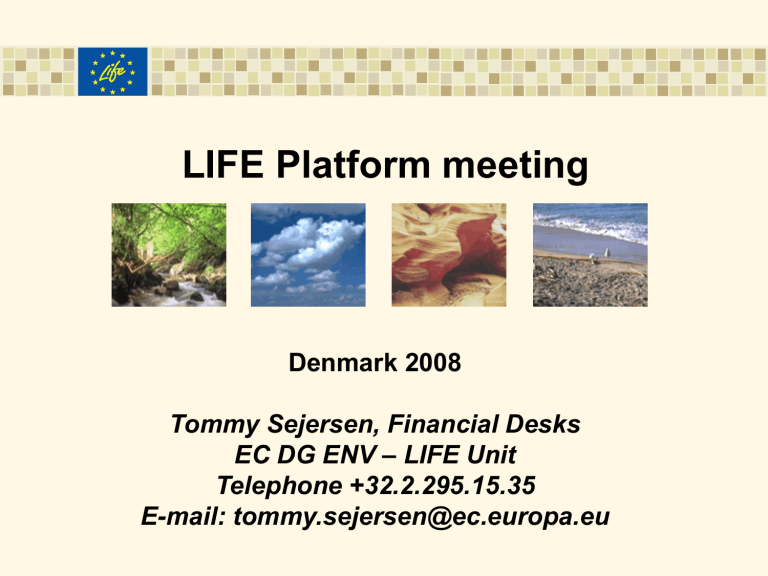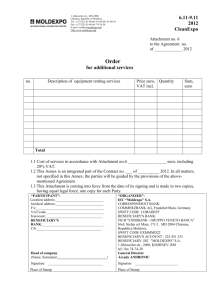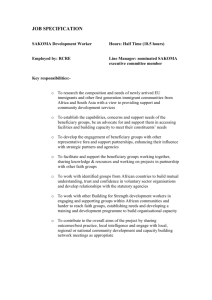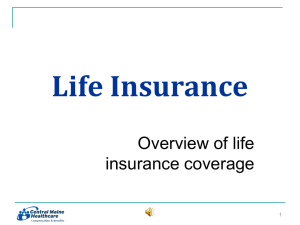financial forms

LIFE Platform meeting
Denmark 2008
Tommy Sejersen, Financial Desks
EC DG ENV – LIFE Unit
Telephone +32.2.295.15.35
E-mail: tommy.sejersen@ec.europa.eu
Legal Framework:
•
Grant Agreement
•
Common Provisions (CP)
•
Application guide
•
Financial Forms
Grant Agreement:
• Maximum grant amount
• Funding rate
• Project period
• Common Provisions (integrated in GA)
• Approved proposal (Annexed to GA)
Project participants
Budget of the project
Common Provisions
Project Actors:
• Beneficiary (Art 4)
• Partner (s) (Art 5)
• Co-financer (s) (Art 7)
• Subcontractor (s) (Art 6)
Art 6.4 : Public tenders obligatory for public beneficiary/partner
Competitive tenders for private beneficiary/partners
Art 6.5: Clear reference to the LIFE-project shall be included in the invoices/order form (also in Art 4.8 & 5.6)
• Amendment to the agreement (Art 13)
• Art 13.2 8th bullet point : 10% and 10.000 € rule
CP define: Eligible costs
(Art 21.1 -21.12)
Provided for in the provisional budget/ Directly necessary for the project
Incurred during the lifetime of the project:
- Legal obligation to pay (the cost) has been contracted after the project start and before the end date
- Execution of corresponding action starts after the project start and is completed before the end date
- Full payment before submission of final reports
- Incurred by the project participants
Exception:
Costs for independent audit Art 27 can be executed after project end date
– but must be terminated, invoiced and fully paid before submission of final report, and auditor is given the assignment before the project ends
CP define: Ineligible costs (Art 22)
Some examples:
Exchange rate losses
Debtors interest/interest on borrowed capital
Services in kind (e.g. voluntary work)
Licence or patent fees related to the protection of intellectual property right
CP define: Payments (Art 23)
The First pre-financing payment (40%)
The Second pre-financing payment (30%)
at least 150% of the first pre-financing used
New from 2005 (other conditions for the projects of 2004 and earlier)
The Balance final payment
Application guide
Section “How to fill in the financial application forms”
Example:
Personnel costs and calculation of annual number of working days,
Information requested in the financial reporting
FINANCIAL FORMS
Where to find the model of financial forms: http://ec.europa.eu/environment/life/toolbox/fi nancial_sheet.htm
Excel based model offering conversion facility
New on-line financial reporting tool - FIRE
Statement of expenditure and income
To be delivered:
Project consolidated statement of expenditure, completed and signed by beneficiary
Participant statement of expenditure, completed and signed by each participant
In balance
Project income (profits generated by the project – Art 20.4)
No profit for beneficiary/partner (Art 20.3)
Interest accrued on the pre-financing amount (Art 20.6)
Name of participant:
Beneficiary (tick if applicable)
Statement of expenditures
Personnel
Travel
External assistance
Durable goods - Infrastructure
Durable goods - Equipment
Durables goods - Prototypes
Land/rightspurchase/lease
Consumable material
Other direct costs
Overheads
TOTAL
Financial Statement of the participant
Partner (tick if applicable)
Total real costs with non-recoverable VAT
€ 100,00
Total eligible costs with non-recoverable
VAT
Statement of income
€ 100,00 EU contribution
€ 10,00 € 10,00 Contribution of the beneficiary
€ 10,00
€ 20,00
€ 20,00
€ 10,00
€ 20,00
€ 10,00
€ 10,00
€ 10,00
€ 10,00 Contribution of the partners
€ 10,00 Other sources of funding
€ 10,00 Direct income
€ 10,00
€ 20,00
€ 10,00
€ 10,00
€ 10,00
Maximum is 7%, i.e. €9,1
€ 220,00 € 200,00 TOTAL
Exchange rate used to convert national currency into EURO, in case only one exchange rate is used (i.e. the exchange rate of the month of the submission of the financial statement as published by the Europena Central Bank):
Date of VAT declaration where appropriate
1
Date and signature
€
€ 20,00
€ 40,00
€ 60,00
% of eligible costs
€ 0,00
€ 0,20
€ 120,00 Budget MUST be in balance
FIRE
Financial check list
General principles:
• Analytical accounting system (“cost centre”).
• Identifiable and exclusive person to approve costs.
• Costs incurred by non-participants (Company groups) –Legal entities
• Mention of the project on the invoice received
Financial check list
Personnel costs (Art 21.2):
• Time registration (time sheets). Model - monthly time-sheet http://ec.europa.eu/environment/life/toolbox/times heet.htm
• Signature and approval of time sheets.
• Annual number of working days.
• Actual annual gross salary.
• Public staff
Calculation of personnel costs
A
B
C
D
E
F = sum of A to E
G
H
Annual salary before tax for the relevant calendar year including 13 th
(or more) month salary.
+ Compulsory social charges
+ Compulsory pension contribution
+ Compulsory holiday allowance
+ Other compulsory allowances
= Gross annual salary costs
Annual time units (*)
Holidays
I
J
Week-ends
Bank holidays
K Mandatory training, sickness etc
L = G-H-I-J-K Annual working hours
M=G/L Annual time unit rate
Financial check list
Travel and subsistence (Art 21.3):
• Internal rules for re-imbursement of travel expenses
• Prior approval by Commission for ex-EU travels
• Detailed specification of travel expenses, two lines if necessary.
• Group low value travel expenses (supported by accounting documents)
Financial check list
External Assistance Art 21.4):
1. Tender requirement of Art 6.4.
2. Mention the project in the invoice (Art 4.8, 5.6 & 6.5)
3. Subcontractors not project participants.
Financial Check list
Durable goods (Art 21.5 – 21.8):
• Purchased in the project period (Art 21.8)
• Actual depreciation (internal accounting standard) up to
25%/50% ceiling (Art 21.6)
• Inventory
• Clearly identifiable
• Nature projects
• 100% eligible – approved
• 25%/50% - not approved, but technically justified
• Prototype not used for commercial activities (Art 21.7)
Financial check list
Overheads (Art 21.12):
• 2005 projects 7% flat rate maximum
• Earlier projects overhead costs should be explained.
Financial check list
Partnership agreements (Art 4.7):
• Is there signed a partnership agreement
• Clear rules for collecting partner’s costs
GENERAL HINTS
FOR
FINANCIAL REPORTING
Study carefully the Common Provisions (CP) and
« re-read » them whenever a problem of administrative-financial nature occurs
Distribute the CP to all project partners and make sure that CP are applied by them
Oblige your partners to forward their project accounting data to you regularly.
Respect the classification of the budget
Keep the project accounting up-to-date , including regular update of the financial forms
Introduce all data requested , i.e. complete all “cells” of the financial forms, or explain why they remain “empty”
Describe with sufficient detail the types of purchased services/goods and their link with the work programme or action
Keep all appropriate supporting documentation for all expenditure and income – including copies of the partners’ supporting documentation
Supporting documentation - Examples: e.g. purchase orders, invoices, payment proofs, public tendering documents for personnel : monthly salary slips, presence/time sheets, calculation of social charges if not included in salary
Commission staff have made a confidentiality promise
VAT:
For VAT charges to be considered eligible the beneficiary must provide a declaration from the relevant national authorities that it and/or its partners must pay and may not recover the VAT for the assets and services required for the project.
Currency of the reports: only the Euro ( €), Art. 25.4 Payments made in different currencies: use the exchange rate applied by the European Central Bank on the first day of the month in which the financial report is presented to the
Commission
Where to find: http: // ec.europa.eu
/ budget / inforeuro / index.cfm
INDEPENDENT AUDIT
New from 2005
Maximum amount of grant ≥ € 500.000
pre-financing (s) > € 750.000
Final payment request > € 150.000
External/Independent
A uditor’s Report
• Find a model of the standard audit report at: http://ec.europa.eu/environment/life/toolbox/standardaudit.htm





![Facilities Claim Form [docx / 210KB]](http://s3.studylib.net/store/data/009702131_1-a76a963067a4586a4f8f1bca351ecaf7-300x300.png)